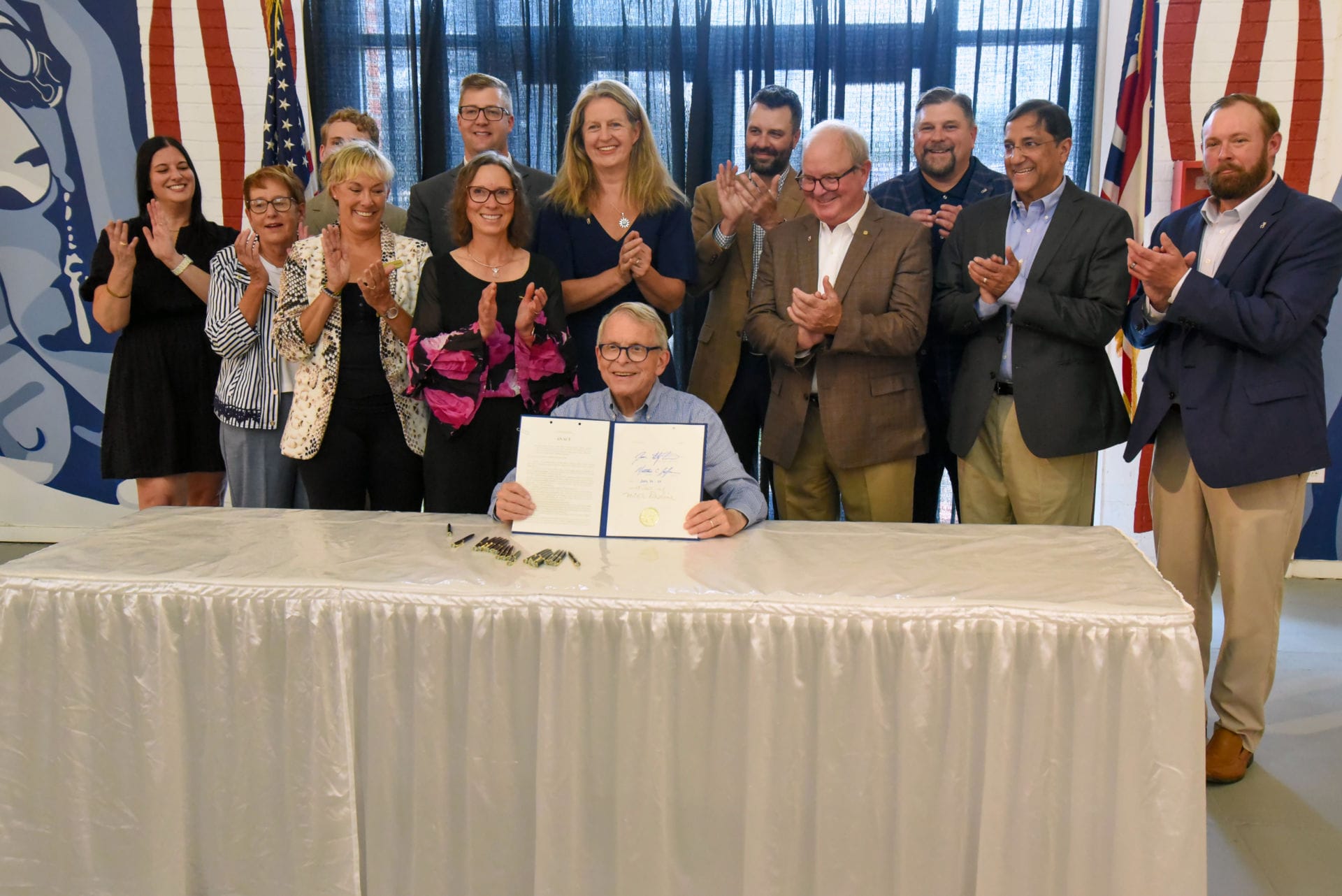Non-covered services, practice portability legislation signed into law

Gov. Mike DeWine signed Senate Bill 40 into law on July 24. This important legislation prohibits dental insurance companies from setting fees for non-covered services and improves professional practice portability by entering into the Dentist and Dental Hygienist Licensure Compact.
Gov. Mike DeWine signed Senate Bill 40 into law on July 24. This important legislation includes two ODA priorities – the Dentist and Dental Hygienist Compact and dental non-covered services reform – both of which will benefit dental patients and dentists across Ohio.
“We are pleased to announce that the Ohio legislature has passed Senate Bill 40, marking a significant legislative victory for our state,” said ODA President Dr. Manny Chopra. “We extend our heartfelt thanks to our dedicated lobbying team and all the member dentists who testified on behalf of the non-covered services bill and the Dentist and Dental Hygienist Compact, whose efforts were instrumental in achieving this success.”
Senate Bill 40 overwhelmingly passed both the Ohio House and Senate with bipartisan support. DeWine’s signature is the culmination of years of effort by the ODA to reform the state’s dental insurance laws on non-covered services and to promote freedom of movement for dentists.
“These reforms are long overdue in Ohio and were passed because of the dedication of the ODA’s advocacy team and member dentists who engaged with policymakers over the years to educate them on the importance of this legislation,” said ODA Executive Director David Owsiany.
Dental Non-Covered Services
Senate Bill 40 prohibits dental insurance companies from forcing dentists to accept fee levels set by dental insurers for services the insurers do not cover. This legislation will go into effect 90 days after it was signed, and dental insurance contracts will be required to comply with the new law starting Jan. 1, 2025.
“The non-covered services bill will protect dentists from unfair insurance practices by prohibiting insurers from dictating fees for services they do not cover, ensuring dentists can establish fair and reasonable fees for their services,” Chopra said.
In the last several years, dental insurers began telling dentists what they can charge for services the insurers do not even cover. This scheme is inconsistent with the fundamental premise of dental benefits, which is to provide coverage for specified dental services for the enrollees. This practice of insurance companies dictating fees for services they do not even cover is creating significant hardships for dental offices and interferes in the dentist-patient relationship on procedures the insurance companies have nothing to do with.
Because of this very situation unfolding in states across the country, policymakers began to take notice and decided reforms needed to be put in place. The National Conference of Insurance Legislators created a model act for states to consider that would prohibit dental insurers from dictating fees for non-covered services.
The ODA has pursued this legislation for several years. Ohio joins more than 40 other states with similar legislation.
Dentist and Dental Hygienist Compact
Senate Bill 40 authorizes Ohio to enter the Dentist and Dental Hygienist Licensure Compact.
“The Dentist and Dental Hygienist Compact will facilitate professional practice mobility and reciprocity, allowing dentists to practice in multiple states without the need for separate licenses,” Chopra said. “This will streamline the licensure process, making it easier for dentists to move and work across state lines, ultimately improving access to dental care. This is a big win for Ohio dentists and dental patients!”
The compact is an interstate agreement that provides a pathway through which dentists and dental hygienists can obtain authorization to practice in states where they are not licensed. Joining the compact would allow dentists and dental hygienists who are licensed in a participating state to practice in any other participating state through a compact privilege. The compact promotes professional practice mobility while maintaining appropriate state dental board oversight.
“The Dentist and Dental Hygienist Compact is a wonderful tool to allow dentists and dental hygienists to utilize their education and skills of their profession in a location of their choice without the burden of the repetitive bureaucracy which was previously necessary to change a location,” said Dr. Joe Crowley, an ODA and ADA past president and the current chair of the Coalition for the Modernization of Dental Licensure. “I feel the Dentist and Dental Hygienist Compact will have a tremendous impact for the newer dentist and hygienist, and the late career dentist and hygienist to be able to move to a location of their choosing with minimal bureaucratic impediment.”
In 2022, the Council of State Governments, the U.S. Department of Defense, the American Dental Association, the American Dental Hygienists’ Association, and other interested parties created a licensure compact for dentists and dental hygienists. A state must enact the compact model legislation via a state’s legislative process to join.
“The ODA and the ADA have had long standing policy to support the portability of their professional license,” Crowley said. “Having the opportunity to advocate for the Dentist and Dental Hygienist Compact accelerated reaching this goal of portability for the profession.”
While promoting professional mobility, Senate Bill 40 also maintains appropriate standards for dentistry in Ohio by requiring that any dentist or dental hygienist practicing in Ohio pursuant to the Compact must follow Ohio’s dental laws and rules and will be subject to the full range of disciplinary authority of the Ohio State Dental Board. Ohio is now the 10th state to pass the Compact, joining Colorado, Iowa, Kansas, Maine, Minnesota, Tennessee, Virginia, Washington and Wisconsin. The legislatures in several other states are also considering the Dentist and Dental Hygienist Compact.
Watch future issues of the ODA Today for more information about how Senate Bill 40 will positively impact Ohio dentists.
